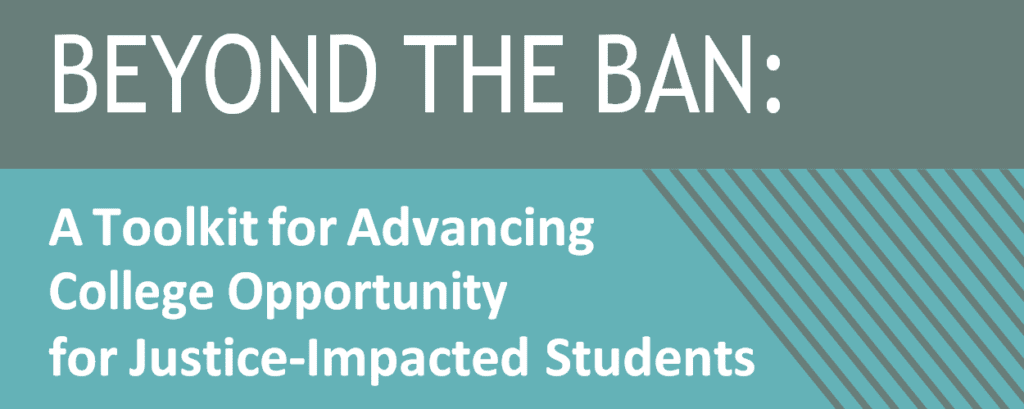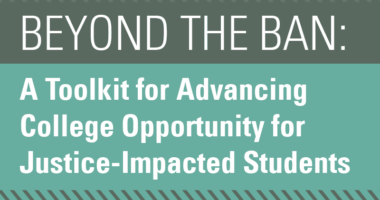
The United States has the world’s largest prison system. While the U.S. constitutes only 5% of the global population, it has more than 20% of the world’s prison population — with nearly 2.3 million people in jails, prisons, and detention centers, according to estimates by the Prison Policy Initiative. And we have long had a mass incarceration problem marked by vast racial and gender disparities, due to a combination of factors, including but not limited to housing segregation, under-resourced schools, bias in the criminal justice system, and a lack of economic opportunities.
Correctional education programs are an essential strategy for breaking the cycles of incarceration and poverty and helping formerly incarcerated individuals to reintegrate into society.
In the 1994 Crime Bill, Congress removed Pell Grant eligibility for incarcerated people, and the number of higher education in prison programs dropped from 800 to only 12 by the year 2005. Congress has now corrected that mistake, and in the 2022-2023 academic year, more than 400,000 incarcerated individuals will become eligible for Pell Grants. But that is just the first piece in what needs to be a broader plan to improve college access and success for students impacted by the criminal legal systems. Whether by intention or continued oversight, too many state policies erect barriers for justice-impacted students instead of fostering access and affordability.
Led by the inaugural cohort of the Justice Fellows Policy Program, The Education Trust, in partnership with local higher education and justice advocates, analyzed state support for currently and formerly incarcerated students in eight states — California, Illinois, Louisiana, New York, Michigan, Ohio, Tennessee, and Texas, and developed state-specific toolkits to help advocates and policymakers tear down the remaining barriers for justice-impacted students.
Each toolkit analyzes state policy to answer eight equity questions:
- Does the state offer state financial aid to currently and formerly incarcerated students?
- Does the state provide sentence reduction credit for incarcerated students enrolled in higher education courses?
- Does the state provide incentives and resources to colleges that enroll and support currently and formerly incarcerated students?
- Does the state have a streamlined process for currently incarcerated students to access documents to retrieve their state identification?
- Does the state allow formerly incarcerated students to access federal support for basic needs like food, housing, and health care?
- Does the state ban higher education institutions from asking about criminal history on admissions applications?
- Does the state ban employers from asking about criminal history on job applications?
- Do currently and formerly incarcerated individuals have the right to vote in the state?
Those closest to the problem are closest to the solution. The eight metrics in this toolkit were created under the guidance and leadership of Ed Trust’s Justice Fellows and other advocates who are formerly incarcerated. Together, we chose metrics that reflect barriers not just to higher education, but also to reentry. These eight metrics speak to students’ overall well-being while in college. For example, students who are food insecure are less likely to graduate than their peers who are not. Identification is required for college enrollment, as well as for securing housing and employment.
We selected states where Ed Trust has regional offices and partnerships with networks and coalitions of education advocates. Despite our diligence, it was difficult to find accurate and up-to-date information for some states, particularly Texas and Louisiana. We are grateful for the advice of the Fellows and other leaders who navigated reentry firsthand and work on the ground in these states.
Recommendations
We are calling on elected officials — governors, state legislators, heads of statewide higher education and corrections departments, and others — to immediately remove these barriers wherever they exist and enact more civil and humane policies that will make it easier for students who are, or have been, incarcerated to pursue a higher education. Congressional delegates can also use their influence at the state level to make a positive impact.
Here are eight recommendations to start with:

1. Rescind all barriers that prevent formerly and currently incarcerated students from receiving state financial aid.

2. Allow students to earn equivalent good time credit, as they do for participating in other correctional rehabilitative programs.

3. Provide resources and supports to institutions that enroll justice-impacted students.

4. Implement a streamlined process for incarcerated students to retrieve their birth certificate, state ID, and driver’s license.

5. Make formerly incarcerated individuals eligible for state and federal programs that provide support for basic needs such as food, housing, and health care.

6. Ban public and private colleges and universities from asking about an individual’s criminal history on initial admissions applications.

7. Ban public and private employers from asking about criminal history on initial job applications.


